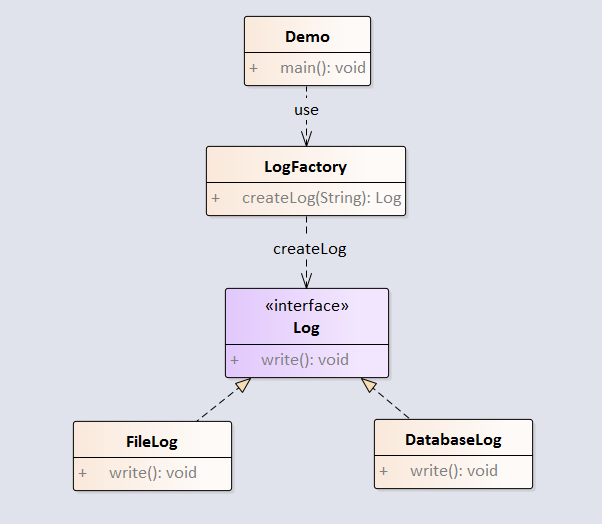简单工厂模式:专门定义一个类来负责创建其他类的实例,被创建的实例通常都具有共同的父类。
例子如下:

代码实现如下:
1.定义Log接口
1
2
3
4
5
6
7
8
| package com.notejava.factory.simple;
public interface Log {
void write();
}
|
2.定义FileLog类
1
2
3
4
5
6
7
8
9
10
| package com.notejava.factory.simple;
public class FileLog implements Log {
public void write() {
System.out.println("write to file");
}
}
|
3.定义DatabaseLog类
1
2
3
4
5
6
7
8
9
10
| package com.notejava.factory.simple;
public class DatabaseLog implements Log {
public void write() {
System.out.println("write to database");
}
}
|
4.定义LogFactory类
1
2
3
4
5
6
7
8
9
10
11
12
13
14
15
16
| package com.notejava.factory.simple;
public class LogFactory {
public Log createLog(String logType) {
if ("fileLog".equals(logType)) {
return new FileLog();
}
if ("databaseLog".equals(logType)) {
return new DatabaseLog();
}
return null;
}
}
|
5.定义Demo类
1
2
3
4
5
6
7
8
9
10
11
12
13
14
15
16
| package com.notejava.factory.simple;
public class Demo {
public static void main(String\[\] args) {
LogFactory logFactory = new LogFactory();
Log fileLog = logFactory.createLog("fileLog");
if (fileLog != null)
fileLog.write();
Log databaseLog = logFactory.createLog("databaseLog");
if (databaseLog != null)
databaseLog.write();
}
}
|
